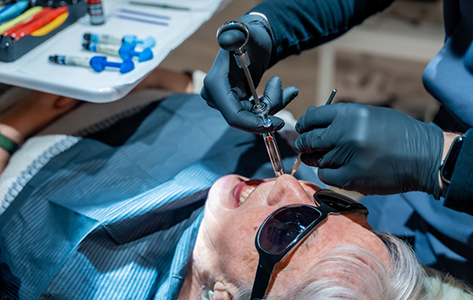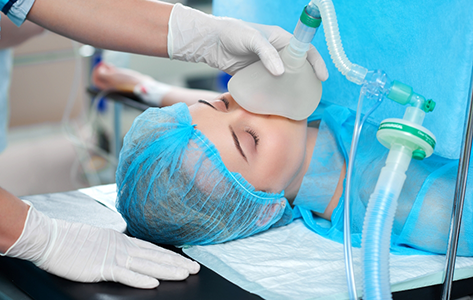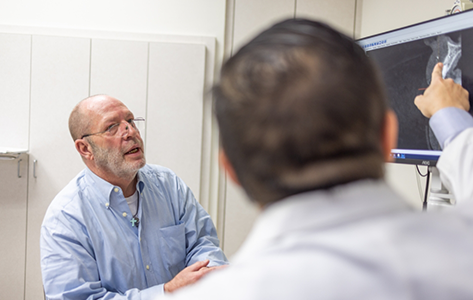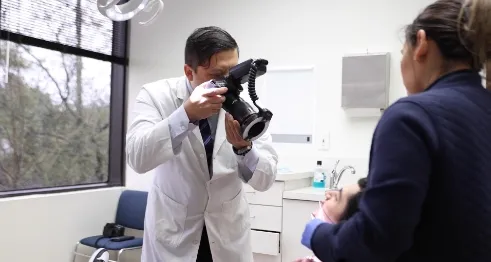Anesthesia & Sedation Dentistry Houston
Remain Safe & Comfortable in the Hands of Experts

Whether you’re receiving more complex and extensive surgery or you’re simply having a tooth extracted, our expert oral surgeons will make sure you remain comfortable throughout your procedure. From local anesthesia to general anesthesia, the team at Piney Point Oral & Maxillofacial Surgery of Houston offers a range of safe anesthesia and sedation dentistry options.
Why Choose Piney Point Oral & Maxillofacial Surgery of Houston for Sedation Dentistry?
- Highly Credentialed Team of Oral Surgeons
- Partnering with Anesthesiologists for Safe, Comfortable Care
- Non-Invasive Local Anesthesia for Minor Procedures
Local Anesthesia

Local anesthesia is a simple, quick method of numbing an area of your mouth that we’ll be working on to either extract a tooth or conduct another more minor procedure. This involves injecting a medication into the oral tissue where the treatment will be rendered. Within a few minutes, that area will be completely numb and the team can conduct the procedure comfortably.
IV Sedation

IV sedation in Houston involves the injection of medications into a vein of the arm to establish a "twilight" effect. In some cases, a state of "ultra-light" general anesthesia may be accomplished. Under this type of sedation dentistry, the patient will experience no pain or anxiety and will be disassociated from the surgery yet will remain responsive and technically conscious.
What Is IV Sedation?

IV sedation, also known as intravenous sedation, is the practice of injecting medications directly into the bloodstream. This method ensures that the effects of the sedation kick in as quickly as possible. IV sedation is sometimes called “twilight sedation” because even though you remain conscious, you may not remember anything after your procedure and might feel as though you are unconscious.
IV sedation is quite powerful, more so than nitrous oxide or oral conscious sedation. Your oral surgeon will carefully monitor you while you are under the influence of IV sedation so they can ensure your safety. It may take up to 24 hours for the effects of IV sedation to completely wear off, so you should have a friend or family member available to drive you home from your appointment.
Who Is a Good Candidate for IV Sedation?

Your sedation dentist in Houston will determine which type of sedation is best for you. IV sedation might fit your circumstances if:
- You suffer from severe dental anxiety or dental phobia, so much so that you wish to feel like you are unconscious during treatment.
- You have a severe gag reflex that makes it difficult to get through dental treatments.
- Your body is highly resistant to numbing agents.
- You do not have any allergies or other medical conditions that could be considered a contraindication for IV sedation.
- You must undergo multiple or extensive procedures in a single appointment.
The Benefits of IV Sedation

Some of the top benefits of IV sedation include:
- It induces a deep state of relaxation that can help even the most anxious patients feel at ease. Therefore, it may help to change the way you view dental treatments while at the same time helping you achieve improved oral health.
- The level of sedation can be adjusted throughout the procedure, ensuring that it will not begin to wear off before the proper time.
- The effects take place quickly due to the way the sedation medication is administered.
- IV sedation is generally safe when it is properly administered and patients are appropriately monitored.
General Anesthesia

This form of anesthesia is administered intravenously and accomplishes a state of unconsciousness. It is reserved for healthy patients in the oral surgery office setting. Patients with certain medical conditions may require hospitalization for this type of anesthesia. Local anesthesia may be used in conjunction with IV sedation or general anesthesia to minimize anesthetic doses and allow you to wake up free of pain.
Patient Monitoring

All patients receiving any type of sedation or general anesthesia are monitored with the latest forms of electronic devices intra-operatively. Blood pressure, EKG (heart), respiration, and blood oxygen levels are constantly monitored for your safety. The doctor and two trained surgical assistants are in the surgical suite the entire time the surgery is in progress.
After the procedure is complete and you have initially recovered from the anesthetic, you are moved to a recovery room for observation. A family member is allowed to sit with you until you are fully alert and ready for discharge. Postoperative and post-anesthetic instructions will be given prior to discharge.
Contact Our Houston Oral Surgeons Today

Your Houston oral surgeons and staff are trained in the management of anesthetic emergencies. Dr. Weil and Dr. Koo are current in ACLS (Advanced Cardiac Life Support) training provided by the American Heart Association. Equipment and medications are available in the outpatient surgical facility to deal with these rare anesthetic-related problems.
Sedation Dentistry FAQs
Is Sedation Dentistry Safe?
For most patients, yes, sedation dentistry is quite safe. Nitrous oxide, in particular, has been shown to produce minimal side effects with a low risk of adverse reactions. Other forms of sedation are also consistently safe when they are administered properly. Your surgical team will make sure to thoroughly screen you for any contraindications before we approve you for sedation. They will also closely monitor you during treatments so they can take fast action on the off chance that something goes amiss.
Will I Remember Anything with Dental Sedation?
Most forms of sedation do not cause unconsciousness. However, you might feel like you were unconscious during your procedure because you may not remember anything. Most patients view this as a big advantage, especially if they dislike the sights, sounds, smells, and sensations of undergoing dental treatment. IV sedation is more likely to cause memory loss than nitrous oxide and oral conscious sedation.
The only form of sedation that causes unconsciousness is general anesthesia, meaning that you are virtually guaranteed to have no memory of your treatment.
What Does It Feel Like to Be Sedated at the Dentist?
What it feels like to be sedated depends on the type of medication that is being used. When under the influence of nitrous oxide, you are likely to feel lightheaded, relaxed, and perhaps a little giddy (it is also known as laughing gas). Oral conscious sedation can make you feel drowsy and calm. It can also induce a somewhat “heavy” feeling. IV sedation feels similar to oral conscious sedation, but its effects tend to be more powerful.
How Much Does Sedation Dentistry Cost?
The cost of sedation can vary from case to case. It depends on the type of sedation, the dosage required, and other factors. Generally speaking, nitrous oxide and oral conscious sedation are relatively affordable. IV sedation costs more because it requires a higher level of monitoring and skill on the part of your dental team. General anesthesia costs the most because strict guidelines are in place to ensure patient safety.
If you are interested in sedation, your surgical team will help you figure out your payment options and whether you’re eligible for financing. Piney Point Oral & Maxillofacial Surgery of Houston also accepts many types of dental and medical insurance. Insurance does not always cover sedation, but it is certainly worth looking into.
Wisdom Teeth Extraction Oral & Maxillofacial Pathology Oral Cancer Screenings Orthognathic Surgery Dental Implants Pre-Prosthetic Surgery Facial Trauma Treatment Apicoectomy Surgery Cleft Lip & Palate Surgery TMJ Treatment Corrective Orthodontic Surgery Sleep Apnea Treatment Cosmetic Facial Treatments Emergency Dentistry View Our Services

